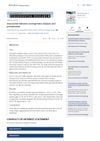
Obesity is linked to many gastrointestinal diseases and needs more research for treatment development.
 February 2012 in “InTech eBooks”
February 2012 in “InTech eBooks” PCOS increases the risk of heart disease and type 2 diabetes in women.
 1 citations,
January 2023 in “Cutis”
1 citations,
January 2023 in “Cutis” The paper concludes that the new medication baricitinib needs further testing in a more diverse group of patients with alopecia areata.
[object Object] 1 citations,
October 2022 in “The American Journal of Gastroenterology” Chronic arsenic exposure can cause liver damage and other health issues.
 June 2024 in “Computational and Structural Biotechnology Journal”
June 2024 in “Computational and Structural Biotechnology Journal” Multi-omics techniques help understand the molecular causes of androgenetic alopecia.
 August 2023 in “Journal of Periodontal Research”
August 2023 in “Journal of Periodontal Research” Hair loss in men aged 25-44 may be linked to gum disease.
149 citations,
January 2011 in “Nature reviews. Urology” Hormonal interactions, especially involving DHT and estrogen, play a key role in BPH development and treatment.
127 citations,
August 2016 in “The oncologist” Understanding and managing side effects of hedgehog pathway inhibitors can improve treatment for advanced basal cell carcinoma.
103 citations,
December 2021 in “Journal of biological rhythms” Shift work disrupts the body's natural clock, leading to health problems.
50 citations,
May 2018 in “International journal of cardiology” Testosterone is linked to cardiovascular risk factors and stroke, but its exact role is unclear.
 47 citations,
September 2022 in “European Heart Journal”
47 citations,
September 2022 in “European Heart Journal” Women may need different blood pressure guidelines than men for heart disease prevention.
35 citations,
October 2017 in “JAMA dermatology” Children with alopecia areata should only have thyroid screening if they have Down syndrome, a history of atopy, family history of thyroid disease, or signs of thyroid problems.
 30 citations,
January 2023 in “EFSA journal”
30 citations,
January 2023 in “EFSA journal” Adults should not consume more than 255 micrograms of selenium per day to avoid risk of hair loss and other side effects.
[object Object] 29 citations,
March 2010 in “Cancer epidemiology” Men who start losing hair at age 30 may have a lower risk of prostate cancer.
 21 citations,
June 2022 in “Molecules”
21 citations,
June 2022 in “Molecules” Perilla frutescens, an East Asian plant, contains 400 bioactive compounds that have various health benefits, including anti-inflammatory, antidepressant, and anticancer effects, and can treat conditions like diabetes, skin allergies, and neurological disorders.
 21 citations,
February 2021 in “Frontiers in Endocrinology”
21 citations,
February 2021 in “Frontiers in Endocrinology” Hormones affect prostate health and disease, with certain hormone imbalances linked to prostate cancer and benign prostatic hyperplasia.
17 citations,
November 2010 in “Perspectives on Psychological Science” Feeling younger can improve health and extend life.
 12 citations,
June 2023 in “Journal of trace elements in medicine and biology”
12 citations,
June 2023 in “Journal of trace elements in medicine and biology” Eating too much selenium can cause bad breath, hair loss, and nail changes, with harmful effects starting at low daily doses.
 12 citations,
February 2023 in “Journal of Personalized Medicine”
12 citations,
February 2023 in “Journal of Personalized Medicine” Type 1 diabetes often occurs with other autoimmune diseases, and personalized treatment based on genetics can improve outcomes.
 10 citations,
July 2018 in “Our Dermatology Online”
10 citations,
July 2018 in “Our Dermatology Online” Some vitamins and minerals are important for preventing hair loss, but treating hair loss with them without a known deficiency is not proven effective.
 9 citations,
January 2022 in “Reproductive Biology and Endocrinology”
9 citations,
January 2022 in “Reproductive Biology and Endocrinology” High levels of male hormones and irregular periods best predict how well PCOS patients will respond to metformin treatment.
8 citations,
November 2023 in “Social Science & Medicine” Gendered social factors, not just biology, contribute to sex differences in adverse drug events.
 7 citations,
July 2019 in “International archives of internal medicine”
7 citations,
July 2019 in “International archives of internal medicine” Common skin conditions can greatly affect a person's mental health and social life.
 3 citations,
September 2021 in “International Journal of Molecular Sciences”
3 citations,
September 2021 in “International Journal of Molecular Sciences” Androgens and a high-fat diet may increase the risk of severe COVID-19 in women with PCOS by upregulating certain proteins in the heart and kidneys.
 2 citations,
June 2023 in “Journal of the American Academy of Dermatology”
2 citations,
June 2023 in “Journal of the American Academy of Dermatology” Hair, skin, and nails supplement use nearly doubled from 2011 to 2020, with higher usage among young adults, females, and certain ethnic groups.
 2 citations,
April 2023 in “Journal of the American Academy of Dermatology”
2 citations,
April 2023 in “Journal of the American Academy of Dermatology” Hispanic/Latinx patients with alopecia areata often have it before age 40, with females and certain health conditions like rheumatoid arthritis more commonly affected.
 1 citations,
January 2023 in “Nutrients”
1 citations,
January 2023 in “Nutrients” Drinking lots of sugary drinks may increase the risk of hair loss in young men.
1 citations,
November 2022 in “Molecules/Molecules online/Molecules annual” Some calcium supplements have more calcium than their labels say, and a few have less.
1 citations,
December 2019 Selenium is essential for health, but too much or too little can cause problems; blood selenium levels are a good measure of intake.
 October 2024 in “Journal of College of Physicians And Surgeons Pakistan”
October 2024 in “Journal of College of Physicians And Surgeons Pakistan” People with androgenetic alopecia are more likely to have metabolic syndrome.



















